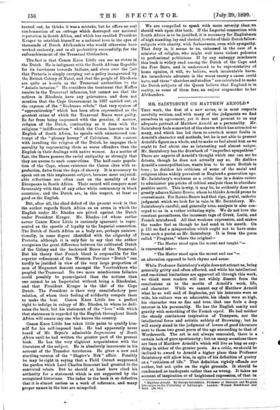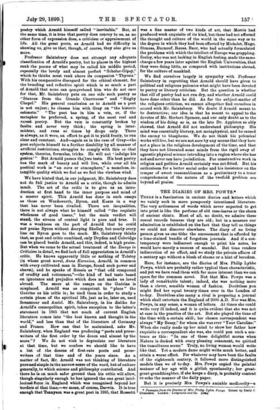MR. SAINTSBURY ON MATTHEW ARNOLD.* THIS work, the first of
a new series, is in most respects carefully written, and with many of the judgments we find ourselves in agreement, yet it does not present to us any adequate portrait of Matthew Arnold as a personality. Mr. Saintabary feels somewhat of the charm which has attracted so many, and which has led them to overloJk minor faults in Arnold's character and methods, but he is not able to present Arnold's figure as a whole, and to make us feel about him as we ought to feel about one so interesting and almost unique.
Mr. Saintebury has the drawback of "imperfect sympathies." There are aspects of Arnold's thought which one can see he detests, though he does not actually say so. He dislikes Arnold's cosmopolitanism, wants him to be more British in tone ; he dislikes his criticism of some of the social and religious ideas widely prevalent in England a generation ago. Mr. Saintabury's weakness as a critic lies in a desire rather to administer pin-pricks of critical analysis than to elucidate positive merit. This is why, it may be, he evidently does not greatly admire Salinte-Beuve, whom he thinks Arnold prone to overestimate. For Sainte-Beave had that ripe, genial, catholic
judgment which we look for in vain in Mr. •Saintsbary. Mr.
Saintsbury's careful, and generally true, analysis is also con- veyed to us in a rather irritating style. We do not love the
constant parentheses, the incessant tags of Greek, Latin; and French introduced: All that weakens expression, and makes the reader feel as though he had sand in his mouth. On p. 115 we find a misquotation which ought not to have come from such a purist as Mr. Saintsbury. It is from the poem called "Progress," where the original-
" The Master stood upon the mount and taught "- is converted into-
" The Master stood upon the mount and saw "- an alteration opposed to both rhyme and sense.
While Professor Saintsbury's style does not attract us, being generally gritty and often affected, and while his intellectual and emotional limitations are apparent all through this work. we think most readers will not widely dissent from the conclusions as to the merits of Arnold's work, life, and character. While we cannot say of Matthew Arnold what he so well said of Sophoclee, yet his interests were so wide, his culture was so admirable, his ideals were so high, his character was so fine and tree, that one feels a deep interest in his personality. He has the English sanity and gravity with something of the French esprit. He had neither the steady continuous inspiration of Tennyson, nor the intellectual force and artistic sublety of Browning; but he will surely stand in the judgment of lovers of good literature next to those two great poets of the age succeeding to that of Wordsworth. The art is not always concealed, there is a certain lack of pure spontaneity ; but on many occasions there are lines of Matthew Arnold's which will live as long as any- thing in either of the greater poets. As a critic, we should be inclined to award to Arnold a higher place than Professor Saintebury will allow him, in spite of his definition of poetry as a "criticism of life." That definition rightly offends our author, but not quite on the right grounds. It should be condemned as inadequate rather than as wrong. It takes no account of inspiration or of heightened expression, of that in
• Matthew Arnold. By GeOrge-Saintsbary, Professor of Rhetoric and English Literature In the University of Edinburgh. London: William Blackwood and • Sons. [3s. 6d.]
poetry which Arnold himself called " inevitable." But, at the same time, it is true that poetry does convey to us, as no other form of expression does, a criticism or appraisement of life. All the great poets, as Arnold had no difficulty in showing us, give us that though, of course, they also give us more.
Professor Saintebury does not attempt any adequate classification of Arnold's poetry, but he places in the highest rank the poems of what may be called his middle pericd, especially the lovely and almost perfect "Scholar-Gipsy," which he thinks must rank above its companion " Thyrsis." With his comparative disregard for the ethical element, for the brooding and reflective spirit which is so much a part of Arnold that none can comprehend him who do not care for that, Mr. Saintsbury puts on one side such poetry as "Stanzas from the Grande Chartreuse" and "Rugby Chapel." His general conclusion as to Arnold as a poet is not unjust ; he classes him with Gray on "the historic estimate." "The poet has in him a vein, or, if the metaphor be preferred, a spring, of the most real and rarest poetry. But the vein is constantly broken by faults and never very thick ; the spring is inter. mittent, and runs at times by drops only. There is always, as it were, an effort to get it to yield freely, to run clear and constant. And—again as in the case of Gray—the poet subjects himself to a further disability by all manner of artificial restrictions, struggles to comply with this or that system, theories, formulas, tricks. He will not ' indulge his genius.'" But Arnold passes the:two tests. His best poetry has the mark of beauty and will live, while over all his poetical work is "an aura or atmosphere," a nameless, in- tangible quality which we feel as we feel the viewless wind.
We have hinted that, in our judgment, Mr. Saintsbury does not do full justice to Arnold as a critic, though he admits much. The art of the critic ie to give us an intro- duction at first hand to the inner purpose and mind of a master spirit. This Arnold has done in such essays as those on Wordsworth, Byron, and Keats in a way that has never been rivalled. There are inequalities, there is not always what he himself called " the requisite wholeness of good tissue," but the main verdict will stand, the stream of central light is pure and true. It was a weakness on the part of Arnold that he could not praise Byron without decrying Shelley, but nearly every line on Byron goes to the mark. Mr. Saintsbury thinks that, as poet and critic combined, only Dryden and Coleridge can be placed beside Arnold, and this, indeed, is high praise. But when we come to the actual treatment of the Essays in Criticism in detail, we find lack of full appreciation in Arnold's critic. He knows apparently little or nothing of Tolstoy (in whose great novel, Anna Karenina, Arnold, in common with every cultivated man in Europe, found such power and charm), and he speaks of Russia as " that odd compound of crudity and rottenness,"—the kind of bad taste based on ignorance and prejudice which does not make us loved
abroad. The sneer at the essays on the Guerins is misplaced. Arnold was as competent to " place " the Guerins as his critic is ; he used them in order to study a certain phase of the spiritual life, just as he, later on, used Senancour and Amiel. Mr. Saintsbury, in his dislike for Arnold's cosmopolitan spirit, takes exception to the latter's statement in 1865 that not much of current English literature comes into " the best known and thought in the world," and less than that of the literature of Germany and France. How can that be maintained, asks Mr. Saintebnry, when England was producing "poets and prose- writers of the first order by the dozen and almost by the score " ? We do not wish to depreciate our literature at that time, but we confess we should like to have a list of the dozens of first-rate poets and prose- writers of that time and of the years since. As a matter of fact, Mr. Arnold was not thinking of literature pureand simple in the narrow sense of the word, but of culture generally, to which science and philosophy contributed. And there he is on much safer ground than his critic will allow, though singularly enough he has ignored the one great intel- lectual force in England which was recognised beyond her borders at that time,—we mean, of coarse, Darwin. It is true enough that Tennyson was a great poet in 1865, that Rossetti was a fine master of two kinds of art, that Morris had produced work exquisite of its kind, but these had not affected the thought and culture of the world in the same way or to the degree in which they had been affected by Michelet, Hugo, Strauss, Burnouf, Reuss, Baur, who had actually formulated the problems with which the intellect of Europe was grappling. Seeley, who was not lacking in English feeling, made the same charge a few years later against the English Universities, that they were doing little, as compared with institutions abroad, for the culture of mankind.
We find ourselves largely in sympathy with Professor Saintsbury in regretting that Arnold should have given to political and religious polemics what might have been devoted to poetry or literary criticism. But the question is whether that rill of poetry had not run dry, and whether Arnold could have done other than he did. As for the subject-matter of the religious criticism, we cannot altogether find ourselves in accord with Mr. Saintsbury. We doubt if Arnold meant to be destructive; our idea is that he meant to appeal to the devotee of Mr. Herbert Spencer, and our only doubt as to the wisdom of his doing so is, as the late Dr. Appleton so ably showed, that Arnold did not understand philosophy. His mind was essentially literary, not metaphysical, and he caused the enemy to blaspheme. We do not think his polemical works will live, but we are not sure by any means that they have not a place in the religious development of the time, and that they have not liberated some minds from the rigid sway of agnostic physical science intruding into a region where she has not and never can have jurisdiction. For constructive work in religion and politics Arnold certainly was not fitted. But his enthusiasm for a better social order and his insistence on the temper of sweet reasonableness as a preliminary to a truer comprehension of the nature of the twofold problem are beyond all praise.



































 Previous page
Previous page